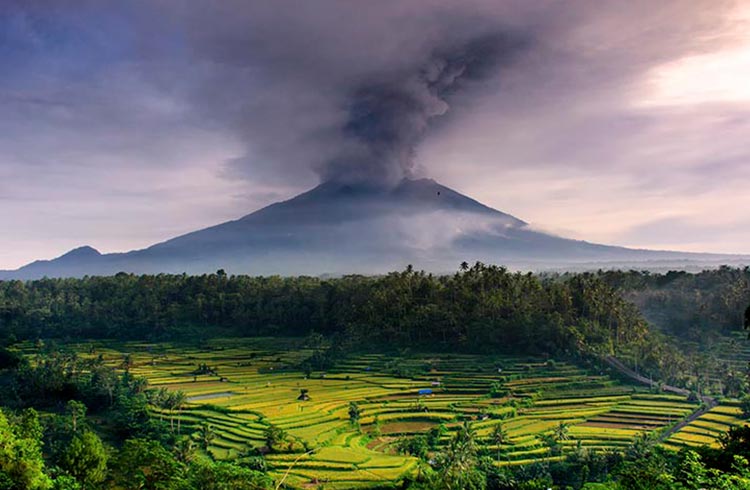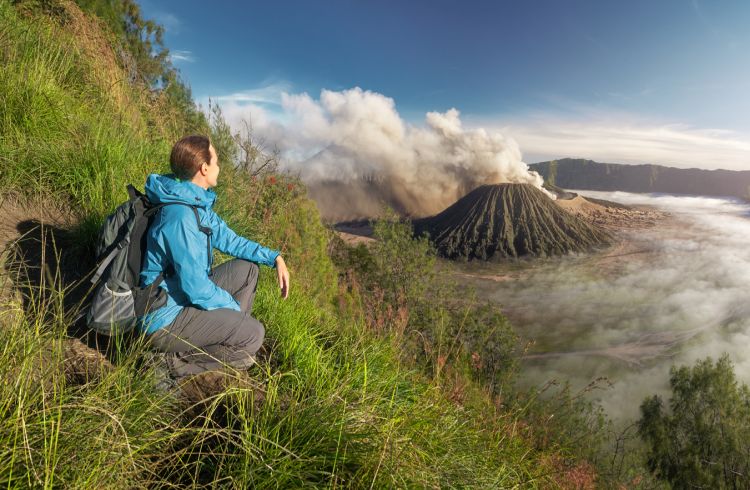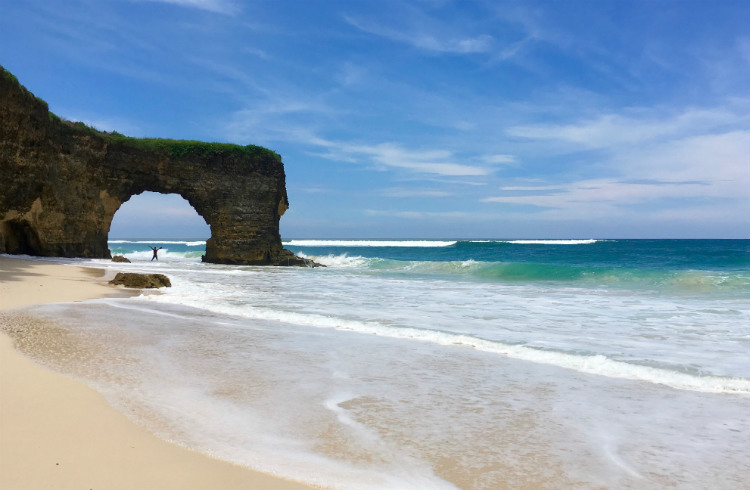Latest Travel Alerts and Warnings for Indonesia
What are the issues affecting travelers to Indonesia? Read the latest travel warnings and alerts.
 Photo © Getty Images/Raung Binaia
Photo © Getty Images/Raung Binaia
Previous travel alerts for Indonesia
Volcanic activity on Mount Merapi, Java – 3 March 2020
On Tuesday 3 March, Mount Merapi, Indonesia's most active volcano erupted on the island of Java, sending a 3mi-high (6km) column of ash into the sky. The airport in the city of Solo was temporarily closed, affecting four flights.
Travelers, and villagers who live near Mount Merapi, have been advised to stay at least 1.8mi (3km) away from the crater mouth due to possible danger from flowing lava and pyroclastic flows.
Indonesia's Geology and Volcanology Research Agency has not raised the alert level, as Merapi was already at the third-highest level due to ongoing volcanic activity.
Stay up to date with local news and media, or contact your travel provider to make sure your plans are not affected.
Mt Agung Eruption – June 2019
Mt Agung's most recent eruption was 13 June, sending ash as high as 30,000ft (9.1km) into the air. The alert level for this active volcano is Level III (Standby), and the probability of future disruption to travel is high.
Travelers are prohibited from climbing the volcano or conducting any activity in the 2.5mi (4km) Hazard Zone surrounding the volcano. It is considered safe to travel in Bali outside of the Hazard Zone.
Because Mt. Agung has been active since 2017, be advised there may not be coverage for claims arising from its volcanic activity since the potential impact to travel is no longer unforeseen.
Travelers are advised to keep updated with local news reports and government travel advisories and to follow all official warnings. Carry identification with you at all times.
Election Protests in Jakarta – May 2019
Protests have broken out in central Jakarta in response to the recent national election results, with thousands of locals taking to the streets. The situation has turned violent with six people killed on the first night of protests and more than 250 people arrested. Molotov cocktails, rocks and fireworks have been used as weapons by those protesting and authorities have responded with tear gas in an attempt to break up the crowds. Infrastructure and properties have also been damaged and large piles of plastic have been set on fire.
In an attempt to control the situation, road closures are in place and transport services may also be interrupted. Cultural and some public buildings may be closed for security reasons.
Government travel advisories have indicated there is a potential risk for protests to occur on the islands of Sumatra and Java. If you are traveling in Indonesia, it's vital that you avoid any political rallies or protests. Should you find yourself inadvertently caught up in civil unrest, check our article for tips to stay safe.
Travelers are strongly urged to keep updated with local news reports, and government travel advisories and follow all official warnings. Carry identification with you at all times. Failure to comply with directives from government authorities may result in you not being covered by travel insurance.
Anak Krakatoa Eruption and Tsunami – December 2018
A tsunami has struck the islands of Java and Sumatra on the 22 December, killing over 280 people and injuring over a thousand, following an underwater landslide. Geological experts have reported the eruption of Anak Krakatoa, located in the Sunda Strait (which separates Java and Sumatra) had partially collapsed during the eruption triggering the subsequent tsunami.
The volcano has been erupting since June 2018.
The Indonesian Tourism Ministry has advised all travelers to stay away from the affected region until further notice.
There will be disruption to travel services and infrastructure, transport and other services. There will also be considerable strain on emergency and medical treatment resources.
Travelers who are on the ground are strongly advised to follow all instructions from government and emergency personnel. Failure to follow official instructions means you may not be covered by travel insurance.
Exercise caution while on the ground and stay away from collapsed buildings and flood waters. Keep updated with official alerts and local news.
If you are in any affected area and have reception or WiFi, it's also a good idea to do the following:
- Contact your travel insurance emergency assistance team
- Make contact with your home government's embassy to let them know where you are
- Contact loved ones back home
- If you are on Facebook, use its Crisis Response tool to let people you are safe.
Check with your travel insurer, as cover for this event may be excluded from a certain date.
Sulawesi Earthquake – September 2018
Some governments are advising their citizens to reconsider traveling to Central Sulawesi, including the city of Palu and the districts of Donggala, Mamuju Utara, Sigi, and Parigi Moutong, due to earthquake risk, disruption to travel services and damage to infrastructure, transport, and other services. There is a considerable strain on emergency and medical treatment resources.
Check your government's advice, and beware the level of warning may have consequences for your travel insurance coverage; generally, travel to destinations at the highest level of alert, such as Do Not Travel, means there is no insurance coverage.
More than 800 people have lost their lives, and thousands are injured due to a 7.4 magnitude earthquake and subsequent tsunami which struck near Palu on the Indonesian island of Sulawesi. Several aftershocks have followed and the tremors have been felt on neighboring islands.
Travelers who are on the ground are strongly advised to follow all instructions from government and emergency personnel. Failure to follow official instructions means you may not be covered by travel insurance.
Exercise caution while on the ground and stay away from collapsed buildings. Keep updated with official alerts and local news.
If you are in any affected area in Central Sulawesi and have reception or WiFi, it's also a good idea to do the following:
- Contact your travel insurance emergency assistance team
- Make contact with your home government's embassy to let them know where you are
- Contact loved ones back home
- If you are on Facebook, use its Crisis Response tool to let people you are safe.
To find out more about what to do in the event of an earthquake, check out our article on earthquake safety
Lombok Earthquake – August 2018
More than 460 people have lost their lives and thousands have been injured as successive earthquakes have struck Lombok since late July. The earthquakes have been felt in neighboring Bali, with homes and buildings crumbling and the evacuation of hotels, restaurants, and bars. There have been strong aftershocks following each earthquake event. In the Gili Islands, thousands fled to higher ground when the quake and aftershocks occurred.
Bali and Lombok's airports are fully functional and travelers who are on the ground are strongly advised to follow all instructions and keep updated with official alerts and local news.
Lombok Earthquake – July 2018
A shallow 6.4 magnitude earthquake rocked the Indonesian island of Lombok on Sunday morning, killing 14 people and injuring hundreds more. A 5.4 magnitude aftershock and numerous others have followed since. Tremors were felt as far away as Bali and East Java.
There is widespread damage across the island, and authorities estimate at least 1,000 homes have been damaged, with East Lombok most affected.
Landslides have occurred in Rinjani National Park resulting in its evacuation and closure.
Check with your insurer, as cover for this event may be excluded from a certain date. Insurance policies are unlikely to cover any earthquake-related claims unless you purchased your policy prior to this earthquake event.
Mt Agung Eruption – July 2018
Mt Agung has been rumbling on and off for several months now, with volcanic ash being belched into the air above. Some eruptions have been more intense than others resulting in the closure of Bali's international airport and flight cancellations or delays.
The Volcano Observatory Notice for Aviation has issued a code orange, highlighting that the volcano is in a period of unrest and there is a heightened risk of eruption activity. There is a 2.48 mi (4 km) exclusion zone around the crater.
Check with your government's travel advisory, your airline and travel insurance provider for further information prior to departure.
Mt Agung Eruption – May 2019
Mt Agung erupted during the night on Friday 24th May, with volcanic material ejected as far away as 2 mi (3 km). There is a 2.48 mi (4 km) exclusion zone around the volcano and authorities have indicated no evacuations were required.
This latest event has resulted in flight cancellations or delays from Bali's Denpasar International Airport. The Volcano Observatory Notice for Aviation has also issued a code orange, highlighting that the volcano is in a period of unrest and there is a heightened risk of eruption activity. Those who are planning to fly to/from Bali are advised to contact their airline for more information including current flight status.
Travelers are advised to keep updated with local news reports, and government travel advisories and follow all official warnings. Carry identification with you at all times. Failure to comply with directives from government authorities may result in you not being covered by travel insurance.
Coverage for Volcanic Activity
It depends on the level of cover you have chosen and the policy you have. If you are a World Nomads customer please check the cancellation and delay provisions for your policy here.
Speak to your airline and travel providers for further information and to make changes.
Before you buy a travel insurance policy, check your government travel warnings and health advice – there may be no travel insurance cover for locations with a government travel ban or health advice against travel.
Related articles
Simple and flexible travel insurance
You can buy at home or while traveling, and claim online from anywhere in the world. With 150+ adventure activities covered and 24/7 emergency assistance.
Get a quote



No Comments